Singaporeans are not getting enough time for sleep and relaxation.
This is according to a global study conducted by Princess Cruises across 12 countries including Singapore.
In fact, 62 per cent of Singaporeans are not getting the sleep they need and 72 per cent of working adults take time off each year just to catch up on sleep. About 33 per cent of employed Singaporeans take a full week off to sleep. And rather than carving out time each day to unwind, 82 per cent of Singaporeans use weekends to make up for the sleep they lost during the week.
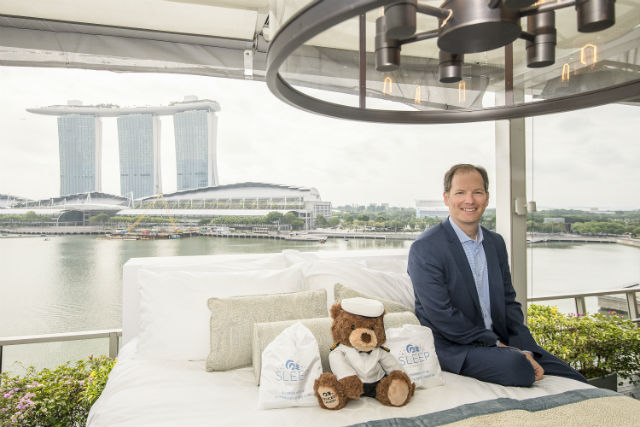
This clearly highlights that people are not getting the time to let go and relax. This is an unsustainable trend that can genuinely impact society as a whole.
Advice from Dr. Michael Breus, a renowned Sleep Doctor
Because of these worrying statistics on Singaporeans and sleep, Princess Cruises had recently invited Dr. Michael Breus – a Los Angeles based sleep doctor who advises A-List celebrities on their sleep, to Singapore, on the first stop of an Asian Sleep Tour.
At the session, Dr. Breus had shared his own sleep advice and relaxation tips, to the members of the media and the guests present at the event, which took place at the Fullerton Bay Hotel.
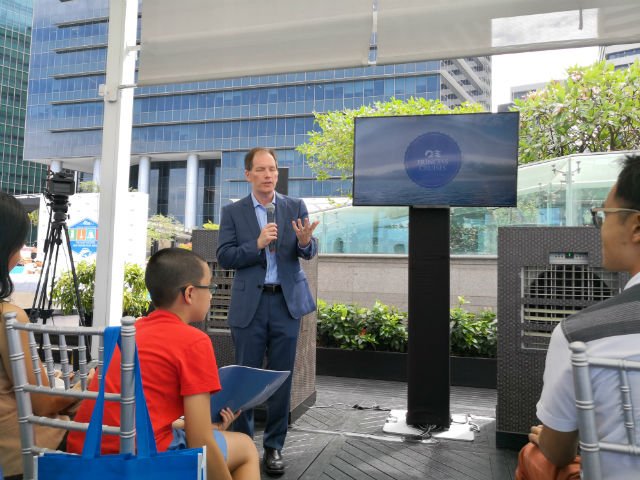
Event was also to launch the Princess Luxury Bed
The event was also the launchpad for the new Princess Luxury Bed, which is the first and only bed in the world developed for a cruise line, by a board certified sleep expert to deliver its guests the ultimate night of sleep at sea.
Said the doctor, “Sleep is a vital, sensory experience that allows our bodies to recharge and recover from mental and physical strains. By collaborating with Princess Cruises, I believe that we will be able to allow guests to sleep really well.”
Eight hours of sleep is a myth
Dr. Breus then went on to explain that various individuals need different amounts of sleep and there is no one-size-fits-all scenario, despite the common saying that everyone needs to have eight hours of sleep per night.
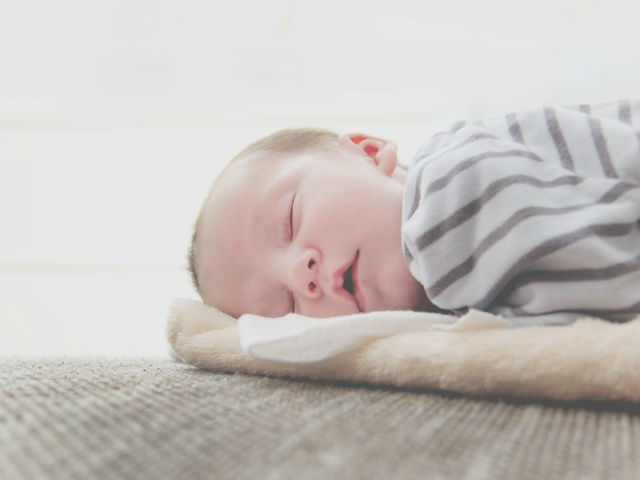
Said the doctor, “Eight hours of sleep is a myth. In fact most people do not need eight hours. For myself, I sleep six and a half hours per night.”
But that said though, he pointed out that anything below six hours is not optimal.
Explained the doctor, “If you are getting less than six hours, that is not great because the body reaction time will slow. But there is also an upper limit though because if you sleep for more than ten hours, this is also not conducive and you will feel depression and fatigue from too much sleep. The window of sleep for most adults is between six to nine hours.”
Continued the doctor, “But if you are fighting a cold or sickness, then you need more than nine hours so that the body can heal itself.”
Five Sleep Cycles
Dr. Breus also explained that sleep is not a continuous process – rather there are different cycles that the human body passes through whenever it goes to sleep.
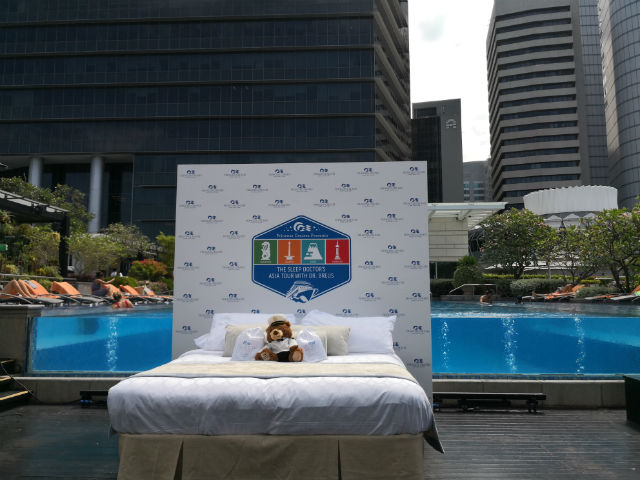
Said the doctor, “Sleep runs in 90-minute segments and these are called sleep cycles. There are four stages of sleep and five sleep cycles and our sleep needs can change because of age. For example, most young people and the elderly need nine to ten hours per night, but adults usually do not require so much sleep.”
Generally within minutes of nodding off, the brain enters Stage One of the sleep cycle. This is when your eye movements slow down and you are in light sleep mode, and can be easily awoken. This is usually when people have brief catnaps.
Stage Two of sleep is also quite light, and is when the brain produces an increase in brain wave activity and slows down further. This stage of sleep is generally known as power-naps.
Stage Three and Four is the beginning of deep sleep and you will not experience any eye movement of muscle activity. It is difficult to be awakened at this stage of sleep as the body is less responsive to external stimuli. This is also when the body repairs muscle and tissue, stimulates growth and development and boosts immune function, as well as building up energy for the following day.
And finally, Stage Five is Rapid Eye Movement (REM) Sleep and you would enter this stage about 90 minutes after falling asleep. Each REM stage can last up to an hour and the average person has four to five REM cycles each night.
This is also the stage of sleep when the brain becomes the most active and dreaming occurs. Your eyes jerk in different directions and your heart rate and blood pressure increases. This is the stage of sleep when your brain also consolidates and processes information to be stored in the long-term memory.
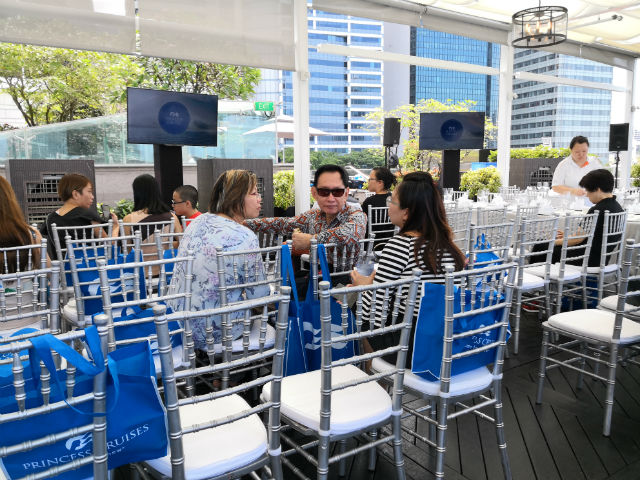
And added Dr. Breus, “People who are often forgetful, for example, nut being able to remember where they put their house keys, car keys or shopping list, that is a sign of REM sleep deprivation.”
Environmental factors affecting sleep
Also, the doctor explained that there are some environmental factors that may influence sleep, the biggest one of them being caffeine.
Caffeine
He said, “Caffeine has a big impact on sleep. Caffeine has a half-life of six to eight hours.”
Continued the sleep doctor, “So I recommend you to stop taking caffeine by 2pm and it will be out of your system by 10pm. Be smart when drinking coffee.”
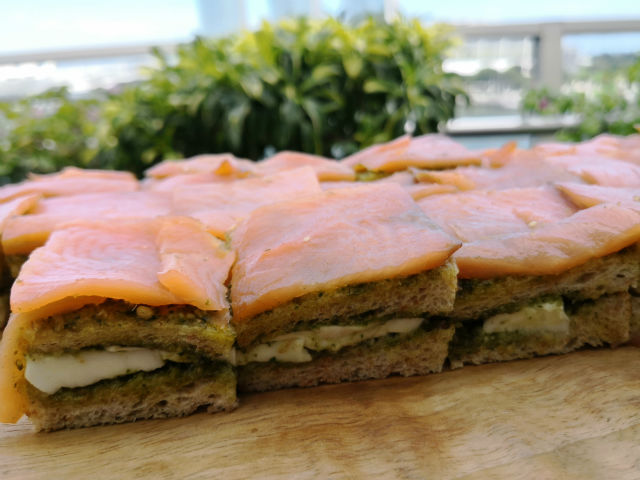
Guests were given refreshments.
Alcohol
Dr. Breus added, “Alcohol is another one. Many people think that alcohol is the biggest sleep aid in the world but it is not the best idea to take alcohol at night. There is a big difference between going to sleep and passing out. Passing out is when you take too much alcohol.
The doctor also shared that while he does enjoy his wine, he makes sure that this habit does not impact on his sleep. Explained Dr. Breus, “For myself, I like a glass of wine or two for dinner, but do not take alcohol three hours before bedtime. Each glass of alcohol takes one hour to digest and the average person takes between two to three glasses of wine. So a three hour time window gives enough time to get the alcohol out of the system before you sleep.”
So instead, Dr. Breus suggests that people drink water instead. He said, “Especially when you are waking up, drink water rather than coffee or tea. We lose a full litre of water each night from sleeping so we will be dehydrated when we get up in the mornings. So water is the best beverage to counter that.”
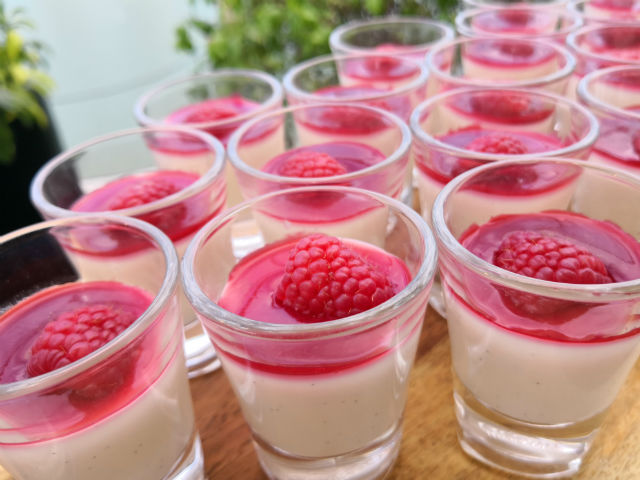
The panna cotta dessert was yummy.
Sunlight
And sunlight is also another factor that has an impact on sleep, continued Dr. Breus.
He explained, “If the sun comes in through the windows, that will turn off the melatonin in the brain. It is good to get 15 minutes of sunlight within 30 minutes of waking up.”
This said though, while the doctor pointed out that it is fine for people who are able to fall asleep with the lights on, those who are struggling to get to sleep but don’t want to turn the lights off due to for example, a fear of the dark, this group should look into getting a night-light and see if that helps them.
However while there is medicine available to help people fall asleep, Dr. Breus generally does not advise you take this because according to him, nothing can beat falling asleep naturally, as opposed to a drug-induced sleep as this will impact the overall quality of a person’s sleep.

Exercise
And as well, doing daily exercise also improves sleep, explained Dr. Breus. He said, “But you do not need to do a lot of exercise. Just 20 minutes daily is good. For example, walking the dog, going to the mall or parking your car one block away will force you to get exercise. But you get revved up by exercise though; so give yourself four hours between completing your workout and sleeping, as that will disrupt your sleep.”
But Dr. Breus pointed out that for those who do intense exercise, such as marathons or triathlons, participating in such exercise can impact sleep adversely though.
He said, “For such athletes, one important thing is to be careful of overtraining. One sign of sleep disruption is that if someone has run 100 Miles for a race and they suffer insomnia after that, that is a sign that they were training too much.”
Continued Dr. Breus, “But that said, we know that athletes need sleep, more so than the average adult.”
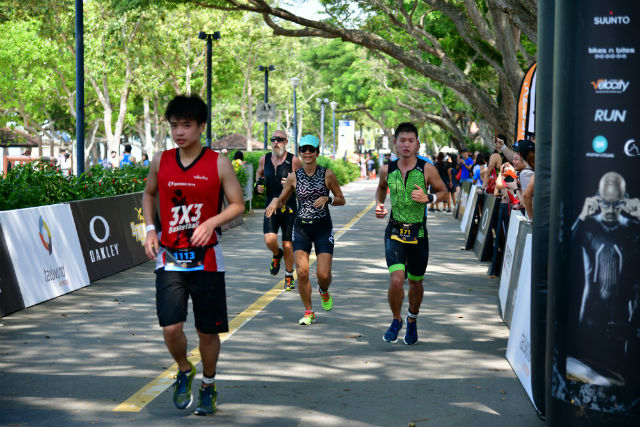
In fact, he recounted that quite recently, together with Princess Cruises, he visited the Singapore Sports Institute and met with the sports psychology department, who works with natural athletes to represent Singapore and found that many athletes were interested in sleep because sleep has become the athletes’ new secret weapon.
Said Dr. Breus, “Performance enhancing drugs have been banned so athletes are now trying to figure out what they can do to their bodies to boost their performance. Sleep is a big one.”
Continued the doctor, “Athletes need sleep for recovery and in fact, it has been proven that sleep extension has improved performance in many sports ranging from distance running to basketball, swimming and badminton. Athletes should get nine to ten hours of sleep per night as their bodies need more time to heal than that of a non-athlete.”
He also added that for athletes with day jobs who may find it hard to get the nine to ten hours of sleep they need, this group should focus on quality sleep instead.
Said Dr. Breus, “This means they should go to bed at the same time and wake up at the same time every day. This is important because the more consistent you are with the body’s circadian rhythm, the brain can get you into a deeper sleep faster as it is not trying to figure things out. Also, if an athlete did not manage to get a great night sleep before an event, napping sometime before the event also helps, to heal the body from anxiety and so on.”
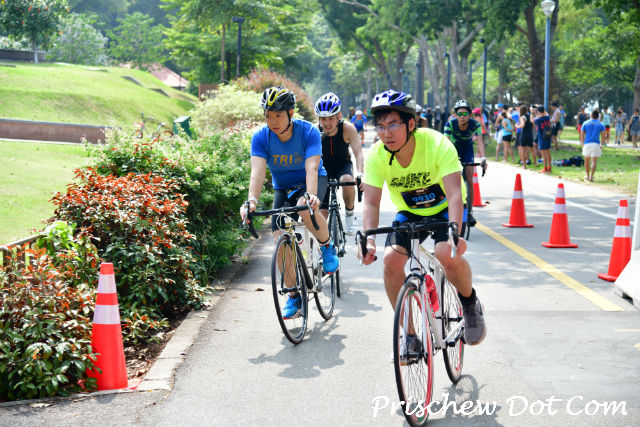
My Takeaways
And after hearing what Dr. Breus had to say, I feel that I can definitely attempt to sleep more, as well as to try and regularise my sleeping hours.
Based on my activity tracker, I’m not getting at least six hours of sleep per night on most occasions and when I wake up, I do not feel well-rested at all. No wonder I often feel tired and lethargic during the day.
Though at times, I feel that making changes to my sleep habits can be quite difficult, because of early-morning training sessions or sports events that I participate in, or evening/night work appointments, in my case. So this may prevent me from being able to go to bed and get up at a fixed time every day.
Taking a look at the Princess Luxury Bed
Following the talk by Dr. Breus, members of the media and guests also had the chance to take a look at the Princess Luxury Bed, which had been on display at the event.
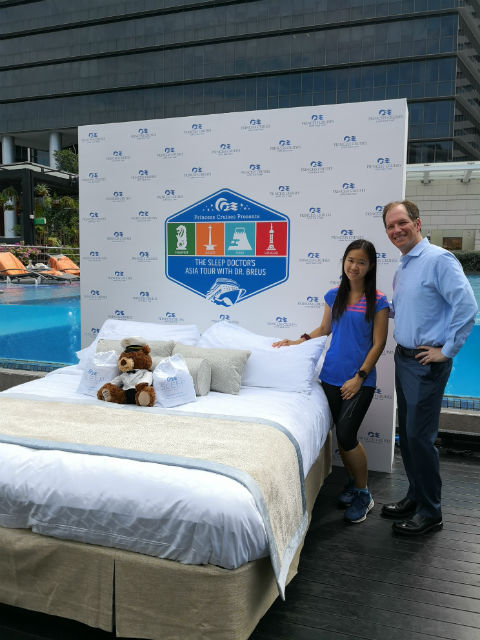
Unfortunately we didn’t get the chance to sleep on the bed and test it out for ourselves, but based on touching it, I must state that the bed feels quite comfortable.
Princess Cruises hopes to roll out the Princess Luxury Bed to over 22,000 of its staterooms by 2019.
This bed features a plush, two-inch thick pillow top, a nine-inch single sided medium firm mattress for enhanced support, and individually wrapped coils for less partner disturbance, a European-inspired duvet and 100 per cent luxurious Jacquard-woven cotton liners.
Together with the bed, a SLEEP By Princess Cruises Kit will also be included in staterooms on board Princess Cruises, and this will feature eye shades, earplugs, aromatherapy scents, and more.
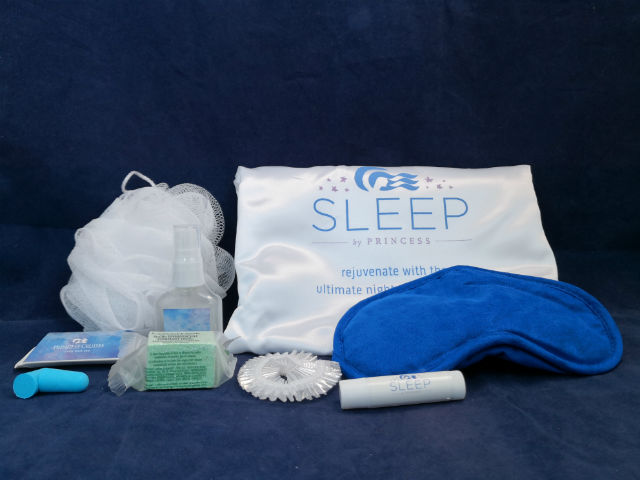
Princess Cruises SLEEP Kit.
This is to prepare guests for the ultimate night of sleep at sea, as many Singaporeans struggle to get a good night’s sleep on holiday; in fact according to the study, about 64 per cent of Singaporeans lack sleep when they are travelling.
And event guests each received a unit of the SLEEP By Princess Cruises Kit in our goodie bags too and in the coming weeks, I hope to be able to make full use of this kit to help me to get a better night’s rest.
This is because with my training for the Berlin Marathon peaking soon, I realise that sleep, especially getting quality sleep, will become more important than ever.

Leave a Comment